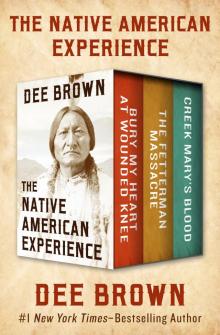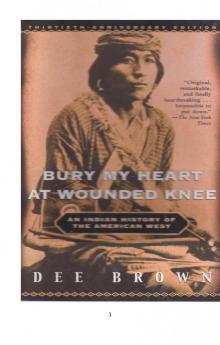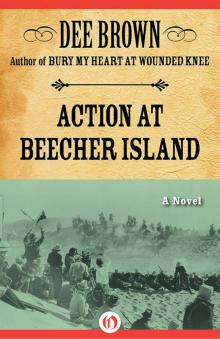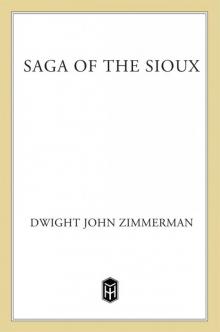Action at Beecher Island: A Novel Read online
Page 14
Schlesinger turned away slightly so the major would not see how moved he was by the compliment; for a moment his throat was so choked he could barely say his thanks.
“Stay by me, Slinger,” the major continued. “After I rest a bit, we’ll have a talk.”
Later on, just before darkness fell, Schlesinger took out a small notebook which he carried inside his shirt. He read his first diary entry, written on the day he joined the scouts: Friday August 28, 1868. I put my name down for Scouting. Drawed horses. He turned through the entries to a fresh page and began writing with a pencil stub: Friday September 18, 1868. Indians made a charge on us at Day brake, but retreated. Kept shooting nearly all day. They put up a White Flag, left us at 9 o’clock in the evening.
“What are you writing, Slinger?” Major Forsyth asked.
“My diary, sir.”
“So you keep a diary? Well, do you know what I did this afternoon during lulls in the action—I began composing a poem in my head. Must write it down soon before I forget it.” He took a deep breath, and shifted restlessly on the stretched canvas. “Perhaps I’ll say it for you, Slinger.” *
For a minute or so, Schlesinger waited patiently, then glanced at the major and saw that his eyes were closed, his face drawn with pain and exhaustion. He wondered how it must be to bear the awful burden of responsibility for men’s lives—against pain of wounds, lack of sleep, and overwhelming odds—like Major Sandy Forsyth.
* Major Forsyth later published the poem in a book written about his Army life:
When the foe charged on the breastworks
With the madness of despair,
And the bravest souls were tested,
The little Jew was there.
When the weary dozed on duty
Or the wounded needed care,
When another shot was called for,
The little Jew was there.
With the festering dead around them,
Shedding poison in the air,
When the crippled chieftain ordered,
The little Jew was there.
17
Major George (Sandy) Forsyth
September 18–19
MAJOR FORSYTH SLEPT FITFULLY through the night of the 18th. At times the pain in his right thigh was agonizing. He could hear the faint breathing of Dr. Mooers, who still lay unconscious opposite him. Occasionally the surgeon’s foot would move against his, as though reaching out to make certain that someone was still there.
Once during the darkest and quietest hour of the night Forsyth heard geese honking overhead, heading south, and he guessed their flight heralded a blast of cold weather. The thought made him shiver involuntarily, and he drew his blanket closer until the heat of his fevered body made him throw it off again.
He was drifting into what he thought was a coma when a rattle of carbine fire brought him wide awake. His eyes blinked against sunrise. Grover was in the next pit, reloading his weapon.
“They’re not trying very hard this morning, Major,” the scout said. “Just testing us, to see if we still have ammunition left.”
When Forsyth sat up, he was shocked at how swollen his right leg was, how bright red the skin was through his ripped trouser leg. He touched the swelling on his inner thigh where the bullet was still imbedded. It was the size of an egg, pressing against an artery. The bullet would have to come out soon.
A few minutes later, Schlesinger’s cheerful face appeared in the trench; he offered the major a strip of horsemeat and a tin cup steaming with hot water. “I’m afraid the meat’s gone reasty, sir,” the boy said apologetically.
Forsyth sniffed the charred strip, tasted it gingerly. It was beginning to smell of decay, but he chewed steadily, washing it down with hot water. “If we only had salt, we could keep it for days yet.” He paused and looked out across the sandy waste of the river. “I wonder … Is Sergeant McCall nearby?”
“Yes, sir,” McCall answered for himself. He had been hunkered down in Grover’s pit, faithfully totaling up his morning report on a regulation army form.
“Any change in our casualties?” the major asked.
“One more yesterday. Slight. George Oakes.”
“We’re doing better. I think our chief concern now is rations. Starvation may become more of an enemy than the hostiles out there.”
McCall agreed. “Our meat won’t keep long in these hot days, for sure.”
“Was there any gunpowder on the pack mules Burke brought over?”
“A couple of small kegs.”
“How is our cartridge supply holding?”
“At the rate we fired yesterday, they’ll last another five or six days.”
“Good. Assign a couple of men to break open a keg of gunpowder and sprinkle some of it on the soundest cuts of meat we have left. The saltpetre will preserve it and give it some flavor.”
McCall nodded. “I should have thought of that, sir.”
“No matter. Another thing we can do when it comes dark again is to hang thin strips of meat on the taller bushes where the sun will dry it. The Indians do that.”
“Yes, sir. I noticed Lew McLaughlin put meat shavings out on his gun blanket in the sun yesterday and it dried nicely.”
Forsyth sipped the last of the hot water and tried to fight away the throbbing torture of his leg. “We must guard against scurvy, too. Schlesinger brought in a few plums at dusk yesterday. Assign a detail to gather more this evening. Ration them out so every man has a few.”
Grover, who had been listening, now spoke up. “Plenty of prickly pears around here, too, Major. I recollect one time Bill Comstock and me lived a week on prickly pears. We boiled ’em down to a sirup. Needles bothered us some, but they kept us alive.”
“We’ll give them a try. But warn the men—” He cut his words off, and bent over to squeeze at his leg.
“That leg is tormenting you, I reckon, Major.” Grover kneeled to examine the unbandaged wound. “Bullet ought to come out, for sure. If it wasn’t for my bad shoulder, I’d have a try myself, but my hand’s not steady enough. A knife slip there and you’d bleed to death.”
Forsyth glanced at Dr. Mooers, who lay motionless except for his irregularly twitching foot. The plum that Schlesinger had placed on his lips the day before had rolled down into his beard. “If only the surgeon—”
“How about Al Pliley?” McCall suggested. “He’s some kind of a doc, I hear.”
They called Pliley, and a lean, haggard man came in hesitantly through the trench. Forsyth greeted him with forced heartiness in his voice: “They tell me you’re some kind of a doctor, Al.”
“No, sir, I’m no doctor. I worked a little while for a horse veterinarian, that’s all, Major.”
“You see this bullet in my upper thigh? It’s got to come out.”
Pliley studied the festering wound and the swollen lump beside it. “You’d ought to wait till a real surgeon can do the cutting. Bullet’s buried itself in by what they call the femoral artery—”
Forsyth was swept by sudden peevish anger. “Damn you, Pliley, if you know the name of the artery, you can cut the bullet out. McCall, give me my razor—it’s in my saddle wallet.”
When McCall handed him the razor, Forsyth opened the shiny blade and offered it to Pliley.
“No, sir!” The frontiersman shook his head stubbornly. “If I cut into that artery, way up there, we couldn’t stop the bleeding, never. Your life would be on my hands, Major.”
“McCall, you do it!”
The sergeant hesitated only a moment. “Even if it’s an order, sir, I can not take the responsibility for putting your life in grave danger.”
Forsyth roared: “You’re a lot of damned cowards!” And then he laughed gently at the pained astonishment on their faces. “Now, this is an order, Sergeant. Put my poncho in your lap, and you others lift me on it.” When this was done, Forsyth ordered Pliley to straddle his knee, facing him, while Grover held on tightly to his ankle. “Now, Al, wipe the sand off your hands and press the fles
h tight around the bullet.” He repressed a cry of pain from the pressure. “Pinch it up so I can get at it!” Forsyth grimly steadied himself, held the razor edge against his aching flesh, and sliced down in one firm motion, prying up the bullet. He lifted it triumphantly. “Don’t you see how easy it is now,” he cried, and then collapsed in McCall’s arms. A burning flood of perspiration flooded into his eyes while Pliley soaked up the blood on his leg with a bandanna handkerchief.
“You were lucky,” Pliley said. “You missed the artery.”
Forsyth could not summon enough strength to sit erect. McCall slipped a saddlebag beneath his head, and a moment later he was in a deep sleep.
It was late afternoon when he awoke, his shirt soaked with sweat. Most of the ache had gone out of his right thigh, but the shattered bone below his left knee was troubling him now. He wondered if pain had been there all the time, overshadowed by the agony of the bullet’s pressure in the other leg. When he rose up to loosen the crude splints, he was surprised to find McCall sitting cross-legged at his feet. The sergeant smiled wearily.
“It’s near sundown,” Forsyth protested. “You should’ve waked me before now.”
“You’ve been sleeping like a babe, sir, and it’s been a quiet day.”
Forsyth scanned both banks of the river. “I see our hostiles are still waiting.”
“That’s about all they’ve done all day. Just waiting us out.”
A breeze chilled the major’s damp shirt, and he pulled his blanket up over his shoulders. “I’m losing track of time, McCall. What day is this?”
“Nineteenth day of September.”
“Stilwell and Trudeau have been gone two days.” He glanced at the sun setting in a bank of scarlet clouds. “Let me have one of your report blanks. I’m going to send another message to Colonel Bankhead.”
With a pencil stub, he began writing:
To Colonel Bankhead, or Commanding Officer, Fort Wallace:
I sent you two messengers on the night of the 17th instant, informing you of my critical situation. If the others have not arrived, then hasten at once to my assistance. I have eight badly wounded and ten slightly wounded men to take in, and every animal I had was killed, save seven, which the Indians stampeded. Lieutenant Beecher is dead, and Acting-Assistant-Surgeon Mooers probably cannot live the night out. He was hit in the head Thursday, and has spoken but one rational word since. I am wounded in two places—in the right thigh and my left leg broken below the knee. The Cheyennes alone number four hundred and fifty or more. Mr. Grover says they never fought so before. They were splendidly armed with Spencer and Henry rifles. We killed at least thirty-five of them, and wounded many more, besides killing and wounding a quantity of their stock. I am on a little island, and have plenty of ammunition left. We are living on mule and horse meat, and are entirely out of rations. If it was not for so many wounded, I would come in, and take the chances of whipping them if attacked. They are evidently sick of the bargain.
I had two of the members of my company killed on the 17th—namely William Wilson and George W. Culver. You had better start with not less than seventy-five men, and bring all the wagons and ambulances you can spare. Bring a six-pound howitzer with you. I can hold out here for six days longer if absolutely necessary, but please lose no time.
Very respectfully, your obedient servant,
GEORGE A. FORSYTH,
U.S. Army, Commanding Company Scouts.
P.S.—My surgeon having been mortally wounded, none of my wounded have had their wounds dressed yet, so please bring out a surgeon with you.
He folded the paper and glanced up at McCall who was waiting expectantly. “I volunteer,” the sergeant said, “to try for Fort Wallace.”
“Can’t spare you, McCall. Tell Jack Donovan I want to see him. He was mighty eager to go in Trudeau’s place the other night.”
When Donovan reported he obviously was still eager. “I don’t want to brag, Major,” he said, “but I wouldn’t be surprised if traveling alone I couldn’t yet beat Stilwell and French Pete into Fort Wallace.”
“You’ll not be going alone,” Forsyth replied bluntly. “Two men are better than one for such an enterprise. You may choose your companion.”
Donovan shrugged. With a finger he flicked sand grains from his long mustache, and then turned his head, looking over the men in their pits as though weighing their relative merits. “All right, sir, I choose Al Pliley. He knows this country.”
“A good man,” Forsyth agreed. He winked at McCall, adding: “And I don’t think he’ll endanger you by taking any wild chances.”
Before nightfall the cloud banks in the west had overspread the sky, and darkness came down abruptly, a solid wall of blackness. After only a brief ceremony of handshaking, Donovan and Pliley crawled out of the defense circle and vanished silently into the night.
For an hour or so Forsyth sat with McCall, both men listening to sounds in the darkness, occasionally talking softly of their experiences in the Civil War. After the sergeant left to make his rounds of the guards, Forsyth noticed that something had changed. In a second or two he knew what it was. Surgeon Mooers was no longer breathing.
He called for assistance, and several scouts came hurrying through the trench. “He’s dead, Major,” Grover announced in a solemn voice. They wrapped the surgeon in his blanket, and then carried him out a few yards and covered him with sand.
Forsyth could not fall asleep. He lay thinking of the strangeness of fate, how it tricks all men in different ways. He wondered how fate had treated young Jack Stilwell and old Pete Trudeau, how it would deal with Pliley and Donovan. Suddenly big drops of cold rain struck his face, followed by a steady pelting shower that rattled upon the dried grass. Somewhere above the clouds, southbound geese were honking again. He drew his poncho over his upper body, hoping the rain would make it easier for Al Pliley and Jack Donovan.
18
John Donovan
September 20–22
TO DONOVAN IT SEEMED that they were heading west, but Pliley insisted that they were not. “We’re pointing straight south,” Pliley said.
Some time between midnight and dawn the rain gradually slackened and when the clouds broke apart, Donovan was relieved to find the north star at his back. “Hadn’t we ought to turn a little more eastward?” he asked.
“If you want to walk all the way to Fort Wallace,” Pliley answered patiently. “If we keep going straight south we’ll cross the stagecoach trail and maybe ride the rest of the way—if the hostiles haven’t stopped the coaches from running.”
Donovan said nothing more, but he was glad Pliley was with him; he would never have thought about the stage line, and already his feet were paining him badly. They had both made the mistake of wearing moccasins taken from dead Indians. Rain and mud had softened the leather that was not meant for walking anyway, and every sharp stone and cactus needle was punishment to their feet.
Sunrise caught them on an open plain, but they soon found a mud-caked buffalo wallow with enough high grass around it for concealment as long as they did not stand erect. They took turns sleeping and keeping watch until noon; then they unpacked some of their horsemeat and tried to eat it. To keep from gagging on the spoiled meat, Donovan drank long swallows of water from his canteen until Pliley reminded him that the nearest stream might be twenty miles away.
“Al, you’re a smart fellow with lots of common sense,” Donovan remarked. “How come you spend your life in this wild Indian country, risking your neck scouting for fifty dollars a month?”
Pliley was sitting cross-legged in his sock feet, scraping dried mud from his trousers. He looked genuinely surprised at Donovan’s question, and turned his head to one side like a bird, pondering a reply. “Never gave it much thought, Donovan. I reckon I just plain like this kind of uncomfortable, miserable, foolish way of living.”
Donovan laughed. “The boys say you was once thinking on being a doctor.”
“Not a word of truth in it
,” Pliley declared. “When I was mustered out after the war I went in with a lawyer in Topeka to study law. But I couldn’t stand being cooped up. First chance I had, I chucked my law books in a corner and headed for Fort Harker to get back with the Army, scouting. I been all over this country round here.”
Most of the day the weather was more like spring than autumn, with chill winds that sent black clouds racing across the sky only to be followed by bright sunshine that burned down upon the unshaded buffalo wallow. They saw no animals or human beings until mid-afternoon when Donovan sighted something moving on the western horizon. He awakened Pliley, who confirmed his guess that they were Indians.
“They’ll likely turn north,” Pliley said. But the Indians kept moving steadily toward the buffalo wallow, and it was soon evident that this was a war party, at least twenty-five warriors, all mounted. “Cheyennes,” Pliley declared. “They’ve seen this rim of grass and may have figured it for a water hole.”
“They’ll be on us in ten minutes,” Donovan said. Both men checked the loads in their carbines and stretched out in prone positions, placing extra cartridges on the ground in easy reach. “You take the left side of their line, I’ll take the right. Maybe we’ll have time for one reload.”
“For a man getting ready to close out his life, you’re a cool one, Donovan.”
The Cheyennes were no more than three hundred yards away, one of them slightly in the lead. Donovan thought he could see a glint in the Indian’s eyes; then suddenly the warrior swung his horse around, halting the others. Across the level prairie, their voices were barely audible. Once during the brief consultation the leader motioned toward the buffalo wallow, and Donovan gripped his carbine tighter.
“Get ready,” Pliley whispered.
But the Indians turned away, bearing off in a slow trot to the northeast. Pliley breathed out a long sigh, and said: “He must have told them there was no water here.”

 The Native American Experience
The Native American Experience Bury My Heart At Wounded Knee
Bury My Heart At Wounded Knee Action at Beecher Island: A Novel
Action at Beecher Island: A Novel Saga of the Sioux
Saga of the Sioux